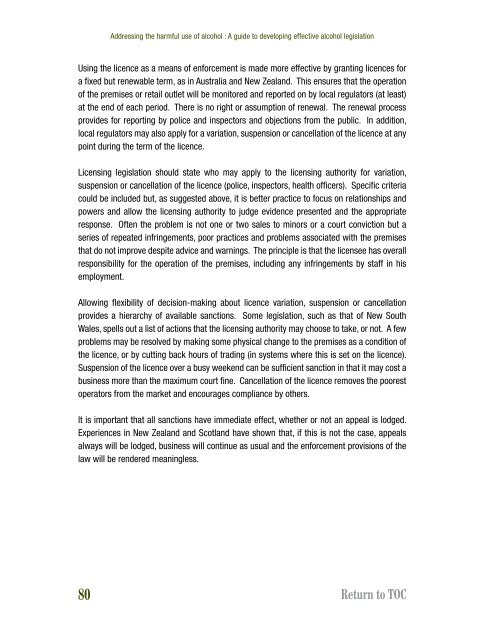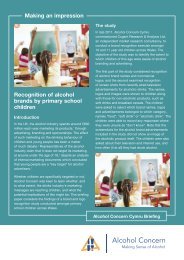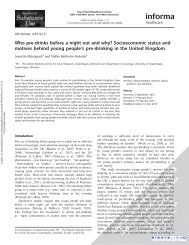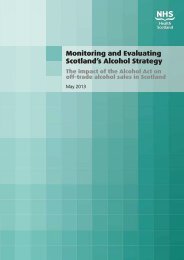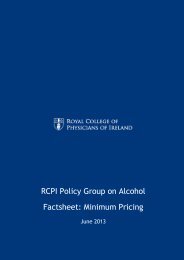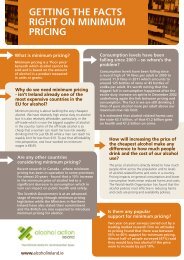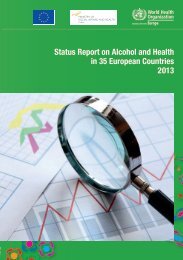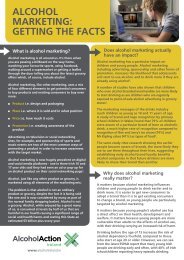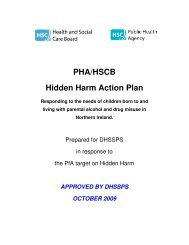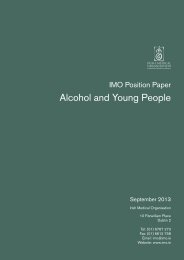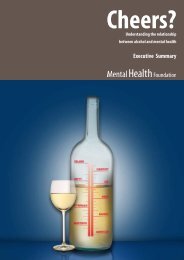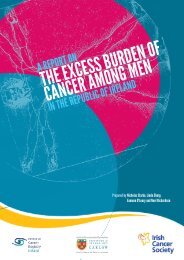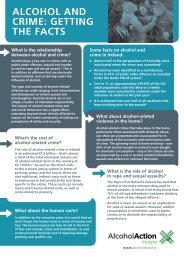Addressing the harmful use of alcohol - WHO Western Pacific Region
Addressing the harmful use of alcohol - WHO Western Pacific Region
Addressing the harmful use of alcohol - WHO Western Pacific Region
Create successful ePaper yourself
Turn your PDF publications into a flip-book with our unique Google optimized e-Paper software.
<strong>Addressing</strong> <strong>the</strong> <strong>harmful</strong> <strong>use</strong> <strong>of</strong> <strong>alcohol</strong> : A guide to developing effective <strong>alcohol</strong> legislation<br />
Using <strong>the</strong> licence as a means <strong>of</strong> enforcement is made more effective by granting licences for<br />
a fixed but renewable term, as in Australia and New Zealand. This ensures that <strong>the</strong> operation<br />
<strong>of</strong> <strong>the</strong> premises or retail outlet will be monitored and reported on by local regulators (at least)<br />
at <strong>the</strong> end <strong>of</strong> each period. There is no right or assumption <strong>of</strong> renewal. The renewal process<br />
provides for reporting by police and inspectors and objections from <strong>the</strong> public. In addition,<br />
local regulators may also apply for a variation, suspension or cancellation <strong>of</strong> <strong>the</strong> licence at any<br />
point during <strong>the</strong> term <strong>of</strong> <strong>the</strong> licence.<br />
Licensing legislation should state who may apply to <strong>the</strong> licensing authority for variation,<br />
suspension or cancellation <strong>of</strong> <strong>the</strong> licence (police, inspectors, health <strong>of</strong>ficers). Specific criteria<br />
could be included but, as suggested above, it is better practice to focus on relationships and<br />
powers and allow <strong>the</strong> licensing authority to judge evidence presented and <strong>the</strong> appropriate<br />
response. Often <strong>the</strong> problem is not one or two sales to minors or a court conviction but a<br />
series <strong>of</strong> repeated infringements, poor practices and problems associated with <strong>the</strong> premises<br />
that do not improve despite advice and warnings. The principle is that <strong>the</strong> licensee has overall<br />
responsibility for <strong>the</strong> operation <strong>of</strong> <strong>the</strong> premises, including any infringements by staff in his<br />
employment.<br />
Allowing flexibility <strong>of</strong> decision-making about licence variation, suspension or cancellation<br />
provides a hierarchy <strong>of</strong> available sanctions. Some legislation, such as that <strong>of</strong> New South<br />
Wales, spells out a list <strong>of</strong> actions that <strong>the</strong> licensing authority may choose to take, or not. A few<br />
problems may be resolved by making some physical change to <strong>the</strong> premises as a condition <strong>of</strong><br />
<strong>the</strong> licence, or by cutting back hours <strong>of</strong> trading (in systems where this is set on <strong>the</strong> licence).<br />
Suspension <strong>of</strong> <strong>the</strong> licence over a busy weekend can be sufficient sanction in that it may cost a<br />
business more than <strong>the</strong> maximum court fine. Cancellation <strong>of</strong> <strong>the</strong> licence removes <strong>the</strong> poorest<br />
operators from <strong>the</strong> market and encourages compliance by o<strong>the</strong>rs.<br />
It is important that all sanctions have immediate effect, whe<strong>the</strong>r or not an appeal is lodged.<br />
Experiences in New Zealand and Scotland have shown that, if this is not <strong>the</strong> case, appeals<br />
always will be lodged, business will continue as usual and <strong>the</strong> enforcement provisions <strong>of</strong> <strong>the</strong><br />
law will be rendered meaningless.<br />
80 Return to TOC


